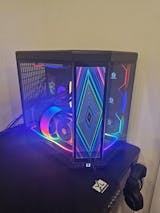The digital age is upon us, and there are more options than ever before that make entertainment and work easier. Today’s computers are designed to handle anything from simple tasks to the most demanding tasks, but it can be difficult to decide what kind of PC is best for you and your digital lifestyle. Although any desktop or laptop can be a home computer, there are various distinctions between gaming computers and consumer computers that may affect your decision to buy. We take an in-depth look at those key differences, so you can spend your money wisely and get the most from your computer. Keep reading to learn more.
Core Components of Consumer Computers
For many years, the only difference between consumer computers and gaming computers was that the latter had newer technology and more power. By definition, a consumer computer is usually powered by either an Intel® or AMD processor. Workstations such as these are usually connected to a monitor and the main circuitry is usually fixed.
Workstation computers are very similar to the average consumer computers, except that they offer more visual versatility for analysts, designers, developers, engineers, and other digital professions that require data manipulation. If you try to play a game on any regular PC, you may notice a lag or that the game breaks down from time to time. Unlike consumer computers, gaming computers have the memory and power to support all the latest games.
Core Components of Gaming Computers
There are many advantages to choosing a gaming desktop or laptop, but you should only make the investment if you plan to use your new PC for that exclusive purpose. Gaming computers can be expensive, but they will give you the competitive edge to take on anything. With higher expectations placed on game developers, games are rising to a higher level of creativity and realism that relies on advanced computer hardware.
Within most gaming computers, you will find state-of-the-art graphics cards. We like to think of these cards as beating hearts that pump pixels from your tower to your monitor. All the new graphics cards take technological leaps from cards found in consumer computers, delivering higher resolution, enhanced mapping, and raw performance.
Most gaming computers on the market feature expensive random-access memory (RAM) tape that corrects any mistakes before they affect your computer. RAID storage gives you the ability to backup data transparently by utilizing a secondary hard disk drive. While consumer computers tend to overheat after prolonged use, hardcore gaming computers are designed with liquid cooling systems to keep your machine cool after hours of gameplay. Water has a high thermal conductivity, which is ideal for resource-intensive tasks such as gaming or video editing.
Choosing Between Consumer and Gaming Computers
Now that you have a better understanding of the fundamental differences between consumer and gaming computers, you should consider how you plan to use your new computing system. Consumer computers are built for emailing, downloading, web browsing, and playing simple video games. Core components of consumer PCs are of average quality, but gaming computers are built to handle high-graphic, high-power games. XOTIC PC offers a wide selection of gaming computers by all the best brands in the industry. We also offer PC customization options, so you can add some personal flair or branding to your favorite machine. If you have any questions about this article, please contact a member of our customer service or sales team today for additional information.














